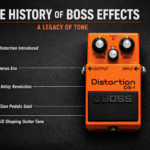The History of Epiphone: From Humble Beginnings to Rock Legend
Epiphone, one of the most iconic names in the guitar world, boasts a history filled with innovation, resilience, and musical legend. While most know Epiphone for its legendary guitar models, few realize the depth of its journey, spanning from a small family workshop in Greece to becoming a globally recognized brand loved by guitarists of every genre. Let’s explore Epiphone’s fascinating evolution from its early beginnings to its legendary status in modern music.
Early Beginnings: The Stathopoulo Workshop
Epiphone’s origins trace back to the 1870s in Smyrna (now Izmir), Turkey, where founder Anastasios Stathopoulo began crafting traditional Greek instruments like lutes and fiddles. After the Stathopoulo family immigrated to the United States, Anastasios continued his craft, setting up a small instrument workshop in New York City around the turn of the 20th century. This early focus on high-quality craftsmanship set the foundation for what would become Epiphone.
Rise in America: Enter Epaminondas “Epi” Stathopoulo
Anastasios’s son, Epaminondas—affectionately called “Epi”—took over the family business in 1915. He was not only a skilled luthier but also a visionary entrepreneur. Epi’s leadership marked a turning point in the company’s history. In 1928, he renamed the company “Epiphone,” blending his own nickname, “Epi,” with “phone,” from the Greek word for sound, “phonḗ.” This rebranding symbolized the company’s commitment to quality, sound, and modern design.
Mandolin Craze and the Jazz Age
Under Epi’s direction, Epiphone expanded its product line to include mandolins, banjos, and archtop guitars, quickly becoming a go-to choice for musicians during the Jazz Age. During the 1920s and 1930s, Epiphone introduced groundbreaking archtop guitars like the Masterbilt series, which attracted musicians with their powerful sound and durable build. Jazz musicians, in particular, gravitated toward Epiphone for its rich, resonant tone and stylish designs, helping solidify its reputation as a top-tier brand in the instrument industry.
Epiphone and Gibson: A Fierce Rivalry
During the 1930s, Epiphone and Gibson became fierce rivals, competing for dominance in the archtop guitar market. Epiphone introduced the Emperor model in response to Gibson’s Super 400, one of the largest and most impressive guitars of the era. The intense competition between Epiphone and Gibson was critical in pushing each company to innovate, producing instruments that set the standard for quality and craftsmanship.
World War II and the Impact on Epiphone
The outbreak of World War II in the 1940s caused significant challenges for Epiphone. Material shortages and the focus on wartime production meant a slowdown in guitar manufacturing. After Epi Stathopoulo’s sudden death in 1943, Epiphone struggled with internal difficulties, leading to a decline in quality and market share. By the late 1940s, Epiphone had lost its position as a leader in the industry, and in the early 1950s, the company faced a financial crisis that nearly spelled its end.
A New Era: Gibson Acquires Epiphone
In 1957, Gibson, under the leadership of president Ted McCarty, acquired Epiphone. This acquisition marked the beginning of a new chapter. Initially, Gibson used Epiphone as a means to expand its production and maintain a broader product line. However, McCarty saw potential in the Epiphone name and decided to use it to differentiate Gibson’s offerings.
Epiphone became known for producing affordable versions of classic Gibson models, including the Les Paul, SG, and ES-335. This strategic shift allowed Epiphone to retain its identity while also benefiting from Gibson’s resources, solidifying its reputation among aspiring musicians who desired high-quality instruments at a more accessible price point.
The Beatles and the Rise of Epiphone in Rock
Epiphone’s resurgence in the 1960s was fueled by a new generation of rock musicians, including The Beatles. John Lennon’s choice of the Epiphone Casino famously brought the brand into the spotlight. Other musicians, such as Paul McCartney and George Harrison, soon adopted Epiphone guitars as well, helping propel the brand’s popularity in the rock scene. This high-profile endorsement established Epiphone as a go-to choice for electric guitars, cementing its place in rock history.
The Epiphone Legacy Today
Today, Epiphone is one of the most recognized names in the guitar industry, celebrated for its blend of quality, affordability, and iconic designs. Owned by Gibson, Epiphone offers a wide range of instruments, from faithful recreations of classic models to innovative new designs. Epiphone’s extensive lineup attracts both beginners and seasoned players, allowing musicians of all skill levels to experience a piece of guitar history.
Epiphone’s Contribution to the Guitar World
Epiphone’s journey is marked by resilience, creativity, and a relentless drive for quality. From humble beginnings to rock-and-roll fame, Epiphone has contributed immeasurably to the music industry, helping shape the sound of jazz, blues, rock, and beyond. Whether it’s an archtop from the Jazz Age or an Epiphone Casino in the hands of a rock legend, Epiphone guitars continue to inspire musicians worldwide.
Key Takeaways
• Founded in the 1870s as a small workshop, Epiphone has grown into one of the world’s most beloved guitar brands.
• Epaminondas “Epi” Stathopoulo drove early innovation, making Epiphone a staple among jazz musicians.
• Gibson acquired Epiphone in 1957, transforming the brand into an affordable alternative for iconic Gibson models.
• The Beatles and other rock legends helped solidify Epiphone’s place in rock history, ensuring its lasting influence.
• Today, Epiphone remains popular for its high-quality, affordable instruments that honor the brand’s storied legacy.
Final Thoughts
Epiphone’s history reflects not only the evolution of musical instruments but also the resilience of a brand that has weathered fierce competition, changing tastes, and economic challenges. Today, Epiphone guitars symbolize accessibility, quality, and innovation, allowing musicians around the world to carry on its legacy with every note they play. Whether you’re a budding guitarist or a seasoned professional, an Epiphone guitar is more than an instrument—it’s a piece of musical history.






